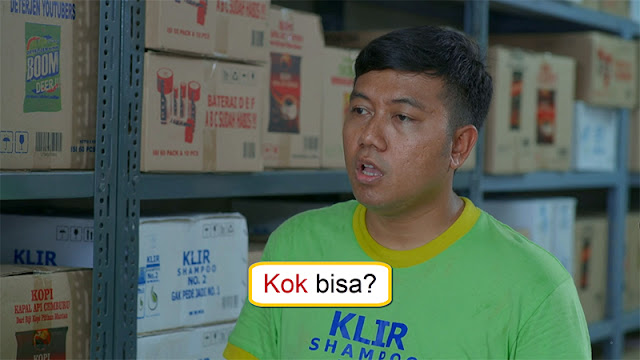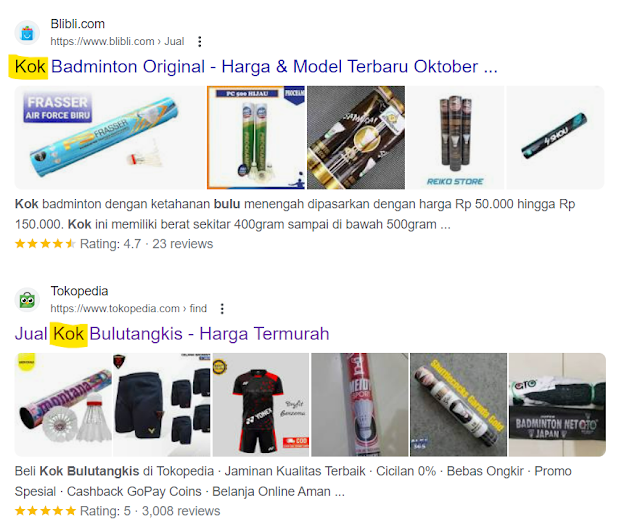- Get link
- X
- Other Apps
Posted by
Iman Prabawa
on
- Get link
- X
- Other Apps
Halo semuanya, ketemu lagi ama aku, Iman Prabawa. In this article, I want to talk about the meaning of the word [kok] in Indonesian. As always, we are also going to be watching examples from movies, YouTube videos, and others where Indonesians use the word [kok].
If you have any questions regarding the Indonesian language, you can ask me directly. You can see how to do that on my About Me page.
If you are a beginner in the Indonesian language, you can learn step by step with My Lesson Here.
So, without further ado, let's talk about this.
Kok In Indonesian
1. We say [kok] to refer to the shuttlecock, a small object that you hit in the sport of badminton, in Bahasa Indonesia.
2. We use [kok] when we want to ask something. It has the same meaning as [kenapa] or [mengapa].
Example sentence:
1. Kok kamu belum pergi? (Why haven't you left?)
2. Kok kamu mau aja sih disuruh-suruh sama dia? (Why is it okay for you to be bossed around like that by her?)
3. We use [kok] to emphasize something. Here, it doesn't have any meaning. Its function is just to emphasize.
Example sentence:
1. Bukan dia kok pelakunya. (He is not the perp.) (*[kok] here is just to emphasize that it is really not he who is the perp.)
2. A: Kamu grogi, ya? (You are nervous, aren't you?)
B: Ngga kok. (No, I'm not.)
How to Pronounce Kok
Here is how you pronounce [kok] in Bahasa Indonesia.
Next, we will watch examples where Indonesians use the word [kok].
Examples of Kok In Use
The first example we are about to watch is taken from Cek Toko Sebelah The Series, Season 1, Episode 3 (2019). Let's watch the clip below.
Below is the conversation from the scene above with English translations.
Yadi: Itu ngajarin kita, bagaimanapun kondisinya, kita harus berani buat jujur, buat ngomong yang benar. (That teaches us, whatever the condition, always be brave to be honest, to speak the truth.)
Ojak: Nah! Bener tuh. (Yup! That is right.)
Yadi: Walaupun akan merugikan kita nantinya. (Even though it will bring us misfortunes.)
Ojak: Iya. (Yup.)
Yadi: Karena kan, sekarang juga, jaman lagi sulit, ya? (Because nowadays, life is tough, right?)
Ojak: Heh! Banget! (Yeah! Totally.)
Yadi: Rupiah melemah. (Rupiah weakens.)
Ojak: He'eh. (Yup.)
Yadi: Ngga stabil perekonomian. (The economy is unstable.)
Ojak: Iya. Nasi uduk aja naik harganya. (Yeah. Even nasi uduk goes up in price.)
Yadi: Berape? (How much now?)
Ojak: Deket rumah gue lima belas rebu sekarang. (Near my home, it is fifteen thousand rupiah now.)
Yadi: Beuh! Masih mending! Deket rumah gue tiga puluh rebu. (That's nothing compared to my place! It is thirty thousand rupiah.)
Ojak: Kok bisa? (How come?)
Yadi: Yang jual ngga pake beha lagi. Wah! (Even the seller doesn't wear a bra. Wow!)
Ojak: Lu yang bener lu?! (Seriously?!)
Yadi: Ya, cowo soalnya. (Yup, because he is a man.)
Ojak: Ooo, gue kirain cewe. (I thought it was a she.)
Yadi: Cewe pake dong. (A girl wears a bra.)
[Kok] in this clip refers to the second meaning of [kok] that I explained above, which is to ask something.
Vocabulary From the Scene
[Itu] = that. For more about this, you can read my article here, Itu In Indonesian.
[Ngajarin] is the colloquial way of saying [mengajari] = to teach.
[Bagaimanapun] = However, whatever.
[Berani] = brave.
[Buat] in here has the same meaning as [untuk] = for.
[Ngomong] is the colloquial word for [berbicara] = to speak.
[Bener] is informal for [benar] = true, correct.
[Merugikan] = make us lose something. [Merugikan] comes from the root word [rugi] with added affix [me+kan].
[Banget] = very. For more about this, you can read my article here, Banget In Indonesian.
[Nasi uduk] is a traditional Indonesian dish that looks like in the picture below.
[Berape] = [berapa] = how much. Betawi people tend to change the letter [a] into [e] when they speak, like [berapa] becomes [berape].
[Rebu] = [ribu] = thousand.
[Masih mending] is usually used when you want to compare something with something. Like in this example, Yadi compares the price of nasi uduk near his place with the price of nasi uduk near Ojak's place.
[Beha] = bra.
[Lu yang bener lu?] is usually used when you don't believe what other people say to you, and you want to know whether it is true or just a hoax.
[Cowo] = [laki-laki] = men.
[Cewe] = [perempuan] = women.
[Gue] is informal for [saya] = I. For more about this, you can read my article here, Gue In Indonesian.
[Lu] = [lo] is informal for [Anda] = you. For more about this, you can read my article here, Lo In Indonesian.
[Kirain] is the colloquial word for [pikir]. [Gue kirain cewe] = [saya pikir perempuan. (I thought it was a woman.]
Read also: Sini In Indonesian
That wraps up today's article. If I find another example, Insha Allah, I will update this article again. Thank you, and I'll see you soon. Buh-bye now.
- Get link
- X
- Other Apps
Hello, I'm Iman Prabawa a.k.a Pak Guru Iman. I love to share about languages. My Instagram, @iman_prabawa



Comments
Post a Comment